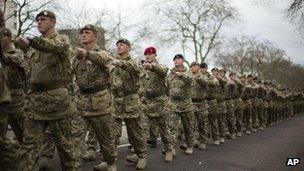Tory backbenchers criticise plan to cut regular army
- Published

The government hopes to train 30,000 more reserves by 2018 to balance the cuts in regular forces
The government's plan to double the size of Britain's reserve forces while cutting the regular army has been criticised by several Tory MPs.
Beckenham MP Bob Stewart described the plan to boost the reserves by 30,000 as "something of a pipedream".
The government plans for 30% of the armed forces to be reserves by 2018.
Defence Minister Andrew Robathan said the government was committed to the expansion and believed it was "perfectly achievable".
Col Stewart, who was a commander of British forces in Bosnia, said the planned cuts should be put on hold until the government could prove its plan would work, and he accused ministers of taking a "gamble with the nations defences.
"History must show us that cutting our defences to the bone, and in my view beyond that, is folly.
"I for one believe we must maintain what we think to be sufficient soldiers to defend our country at whatever price."
John Baron, the Conservative MP for Basildon & Billericay and a former captain in the Royal Regiment of Fusiliers, said disbanding five infantry battalions before it was clear whether more reserves could be recruited was a "foolhardy and high-risk strategy".
Mr Robathan said the government would ensure the reserve forces had modern equipment and vehicles to make the change possible but he said it would require a change in the attitudes of society and the regular armed forces.
He denied that the government had come to power with the intention of cutting the armed forces but said they had inherited a £38bn black hole in the MoD finances.
Last year Defence Secretary Philip Hammond revealed plans to cut the size of the regular armed forces from 102,000 to 82,000, while increasing the number of reserves to 30,000.
Shadow defence minister Gemma Doyle said the plan could only work if the government worked with employers and suggested considering anti-discrimination legislation for reservists to help them combine working life with a career in the reserves.
- Published23 April 2013
- Published15 April 2013
- Published29 March 2013